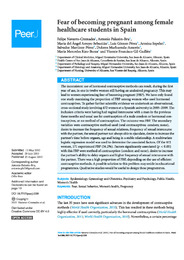Título :
Fear of becoming pregnant among female healthcare students in Spain |
Autor :
Navarro Cremades, Felipe
Palazón-Bru, Antonio 
Arroyo-Sebastián, María del Ángel
Gómez-Pérez, Luis 
Sepehri, Armina
Martínez Pérez, Salvador 
Marhuenda Amoros, Dolores 
Rizo-Baeza, María Mercedes
Gil-Guillén, Vicente F  |
Editor :
Peer |
Departamento:
Departamentos de la UMH::Patología y Cirugía |
Fecha de publicación:
2015-08-25 |
URI :
https://hdl.handle.net/11000/34897 |
Resumen :
The inconsistent use of hormonal contraceptive methods can result, during the first year of use, in one in twelve women still having an undesired pregnancy. This may lead to women experiencing fear of becoming pregnant (FBP). We have only found one study examining the proportion of FBP among women who used hormonal contraceptives. To gather further scientific evidence we undertook an observational, cross-sectional study involving 472 women at a Spanish university in 2005-2009. The inclusion criteria were having had vaginal intercourse with a man in the previous three months and usual use for contraception of a male condom or hormonal contraceptives, or no method of contraception. The outcome was FBP. The secondary variables were contraceptive method used (oral contraceptives; condom; none), desire to increase the frequency of sexual relations, frequency of sexual intercourse with the partner, the sexual partner not always able to ejaculate, desire to increase the partner's time before orgasm, age and being in a stable relationship. A multivariate logistic regression model was used to determine the associated factors. Of the 472 women, 171 experienced FBP (36.2%). Factors significantly associated (p < 0.05) with this FBP were method of contraception (condom and none), desire to increase the partner's ability to delay orgasm and higher frequency of sexual intercourse with the partner. There was a high proportion of FBP, depending on the use of efficient contraceptive methods. A possible solution to this problem may reside in educational programmes. Qualitative studies would be useful to design these programmes.
|
Palabras clave/Materias:
fear
sexual behavior
women's health
pregnancy |
Tipo de documento :
info:eu-repo/semantics/article |
Derechos de acceso:
info:eu-repo/semantics/openAccess
Attribution-NonCommercial-NoDerivatives 4.0 Internacional |
DOI :
10.7717/peerj.1200 |
Publicado en:
PeerJ . 2015 Aug 25:3:e1200 |
Aparece en las colecciones:
Artículos Patología y Cirugía
|

 La licencia se describe como: Atribución-NonComercial-NoDerivada 4.0 Internacional.
La licencia se describe como: Atribución-NonComercial-NoDerivada 4.0 Internacional.
.png)